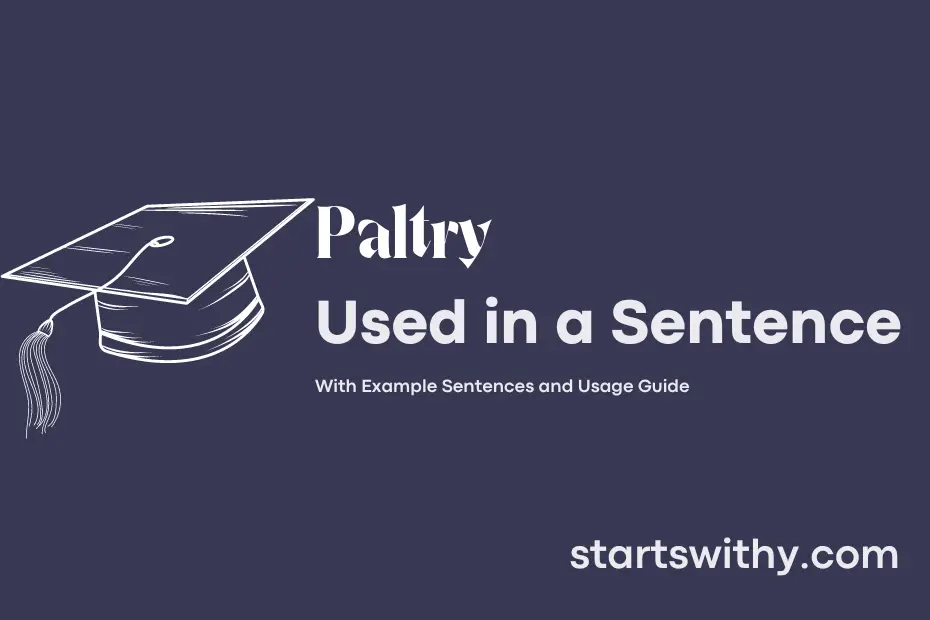Have you ever heard of the word “paltry” and wondered what it means? Derived from the Latin word “paltire,” meaning to be reduced, “paltry” is an adjective used to describe something that is insignificant, meager, or of little value.
When something is referred to as paltry, it typically implies that it is lacking in quantity, quality, or importance. This word is often used to convey a sense of disdain or disappointment towards the small or insufficient nature of something.
7 Examples Of Paltry Used In a Sentence For Kids
- My paltry collection of marbles is not enough to play with all my friends.
- The old man gave the beggar a paltry amount of money for food.
- The little bird flew away with its paltry worm for breakfast.
- The elephant was not pleased with the paltry amount of peanuts it was given.
- The tiny mouse’s paltry hole was easy for the cat to find.
- The farmer was disappointed with the paltry harvest of corn this year.
- I only had a paltry number of candies left in my bag after sharing with my friends.
14 Sentences with Paltry Examples
- The college canteen charges a paltry amount for a plate of samosas.
- We were offered a paltry discount on our textbooks during the back-to-school sale.
- The dormitory’s laundry facilities had a paltry selection of washing machines available for use.
- The club’s budget for organizing events is usually quite paltry.
- The library fines for overdue books are relatively paltry compared to other institutions.
- The scholarship amount awarded to the student was disappointingly paltry.
- The college’s Wi-Fi connection speed was quite paltry, making it difficult to complete online assignments.
- The stipend for the internship was a paltry sum that barely covered transportation expenses.
- The seating capacity in the student cafeteria was paltry, leading to long lines during peak hours.
- The campus store had a paltry assortment of stationery supplies available for purchase.
- The gym’s operating hours were limited, with a paltry number of workout machines available for use.
- The college’s career counseling services received paltry funding, resulting in limited resources for job placements.
- The student union’s annual budget allocation for organizing cultural events was disappointingly paltry.
- The research grant awarded to the faculty member was a paltry amount that barely covered project expenses.
How To Use Paltry in Sentences?
To use the word Paltry in a sentence, it is important to understand its meaning and how it can be incorporated effectively. The word Paltry is an adjective that is used to describe something as being small or insignificant in amount, value, or importance. Here is a guide on how to use Paltry in a sentence for beginners:
-
Identify the context: Before using the word Paltry, consider the situation or context in which you want to use it. Is it something of little value or importance that you want to describe?
-
Choose the appropriate position: The word Paltry is usually placed before a noun to describe it. For example, “The beggar only asked for a Paltry sum of money.”
-
Be clear and concise: When using the word Paltry, make sure your sentence is clear and concise to convey your message effectively. Avoid using unnecessary words that may overshadow the meaning of Paltry.
-
Practice using it: To become more comfortable using the word Paltry, practice incorporating it into sentences in different contexts. This will help you become more confident in your use of the word.
By following these tips, beginners can effectively incorporate the word Paltry into their vocabulary and communicate their ideas more precisely. Remember to keep practicing and experimenting with the word in various sentences to become more proficient in its usage.
Conclusion
In conclusion, the examples provided illustrate how paltry sentences can lack substance or importance, often being deemed not worthy of attention due to their trivial nature. Whether they are short, meager, or insignificant in content, paltry sentences fail to resonate with the reader or convey a meaningful message. They can come across as weak, unconvincing, or simply not impactful enough to leave a lasting impression.
It is important to recognize the limitations of paltry sentences in communication, as they may hinder effective expression or fail to engage the audience. By striving to craft sentences that are substantial, impactful, and meaningful, we can ensure our message is clear, engaging, and able to convey the intended thoughts and emotions effectively.



